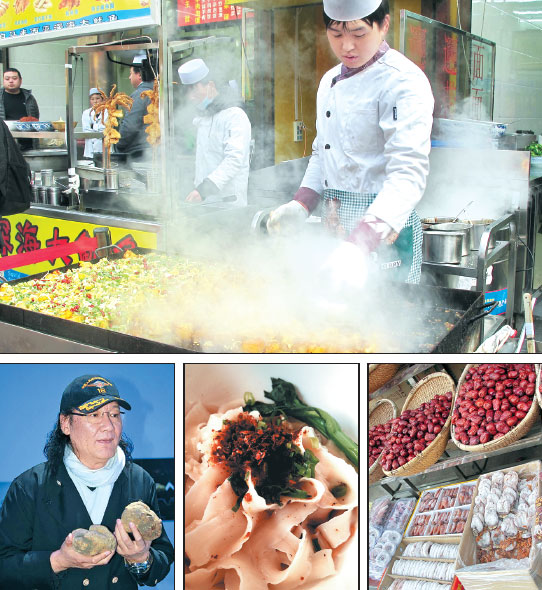Centuries of flavor
By Mike Peters (China Daily) Updated: 2017-03-07 07:11Foods from Chinese tomatoes to wine are in the spotlight in events celebrating foods of today's Silk Road, Mike Peters reports.
If Marco Polo could see me now, he'd be shocked.
I am attending a conference titled Top 100 Food Materials Along the Silk Road, and I am biting into a fresh, perfectly ripe tomato.
Polo wouldn't have recognized this robust red beauty, produced by an Inner Mongolia farm for online seller Lao Nong Bu Luo. There's still a chill in the Beijing air, but as the sweet-and-acid juice rolls across my tongue, I am transported to summer, the season tomatoes claim as their own. (Thanks to expert greenhouse growers, tomatoes can be quite fabulous even in March.)
Tomatoes are a New World product, popular from Ecuador to Mexico long before Marco Polo and Silk Roadies of the 13th century made a link between Chinese noodles and Italian pasta. Neither China nor Italy knew tomatoes then - they were introduced to the Venetians as ornamental plants about 200 years later, and Italians didn't start eating them until about two centuries after that. Chinese embraced them even later, a mere 150 years ago perhaps.
But the chefs, foodies, traders and ambassadors who have filled a banquet room at Beijing's JW Marriott aren't here to quibble about history. We're here to eat our way along today's Silk Road, highlighting both the broad cultural interest in the ancient commercial network and the economic energy that's reviving it today.
So besides Inner Mongolia's tomatoes, there are dozens of tables cluttered with modern goods.
Organic chardonnay and cabernet sauvignon from Xinjiang wineries.
Sweet and savory snacks from all over China.
Herbal teas full of traditional ingredients.
Lotus seed juice from Fujian province.
Ham.
Sausage.
Soy in every form imaginable.
The daylong event has been organized by the East Eat group, concluding with an awards dinner for the Best Young Chinese Chefs of the Year, an annual event since 2000.
The keynote speaker for the morning is celebrity chef Dong Zhenxiang, instantly recognizable as Da Dong both because of his famed restaurants and because he stands 193 centimeters tall. Long a student of China's food culture, Dong journeyed to Italy last year to complete a culinary journey he titled "From Dunhuang to Sicily". From that he produced a documentary video of his pursuit of Silk Road foodstuffs - and a special menu featuring ingredients he matched from both ends of the Silk Road.
Last week's event included awards for dozens of Chinese chefs, a judging panel for the foods competition, and cooking presentations by chefs from many embassies in China - a "gastro-diplomacy" effort that will be continued in May.
What's being billed as the first Gastro Diplomacy Chef Competition in the world will take place in Beijing on May 23. The chefs from several dozen embassies in Beijing will compete at the National Convention Center all day, with a public announcement of the winners at the Olympic Stadium (the Bird's Nest) on the following evening. The chefs will use their own ingredients to showcase the best food products of their countries. There will be awards for chefs by geographical areas, by type of recipe (vegetarian, meat, fish, pastry and dessert, finger food), health and nutrition, matching food and wine, and creativity. There will be an overall ranking for the best three chefs from Beijing embassies.
The public will be welcome to taste, enjoy, and buy the best foods and drinks from exhibiting countries on stands in the 20,000 square meters halls of the event, next to the show kitchens of the chefs' competition.
The week will include parallel events being held in Yantai, Shandong province.
The May competition has three organizers:
? The Global Center for Gastro Diplomacy, founded and presided by Guillermo Gonzalez Arica, former ambassador from Peru to Honduras. Its objective is to promote professional chefs in embassies worldwide, to increase food culture exchanges as well as promoting trade and jobs.
? Gourmand International, the organizer of the Gourmand World Cookbook Awards, founded by Edouard Cointreau. More than 200 countries participated in the latest competition. The last three Best in the World Gourmand events have been in China, with the next one in Yantai on May 27 and 28.
? The East Eat group, a leader in the food and hospitality trade media and events, founded and run by Liu Guangwei.
"The Gastro Diplomacy Chef Competition is part of the Belt and Road Initiative," says Cointreau, "with two other chefs competitions in parallel".
The public is welcome to watch all three chefs' competition from May 22 to 24 at the National Convention Center, in Beijing's Olympic Park.
There will be numerous show kitchens, stands selling products, country food tourism stands, wine and drinks tastings, and conferences.
The results of last week's event - and similar programs around the world - will be announced then as the Top 100 Food Ingredients for the Belt and Road Initiative.
Contact the writer at michaelpeters@chinadaily.com.cn
|
Clockwise from top: Street food in Xi’an highlights Silk Road flavors; dried fruits in street markets of northwestern China; Shaanxi noodles at Dragon Palace in Xi’an; celebrity chef Dong Zhenxiang showing truffles he used during his culinary journey in Italy. Photos Provided To China Daily |
- 'Cooperation is complementary'
- Worldwide manhunt nets 50th fugitive
- China-Japan meet seeks cooperation
- Agency ensuring natural gas supply
- Global manhunt sees China catch its 50th fugitive
- Call for 'Red Boat Spirit' a noble goal, official says
- China 'open to world' of foreign talent
- Free trade studies agreed on as Li meets with Canadian PM Trudeau
- Emojis on austerity rules from top anti-graft authority go viral
- Xi: All aboard internet express












